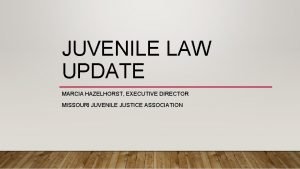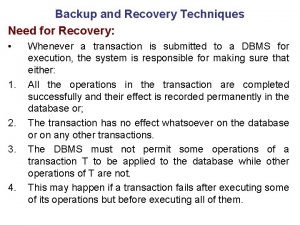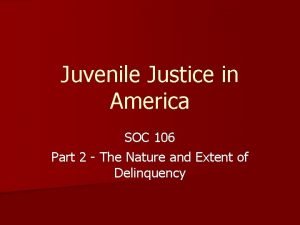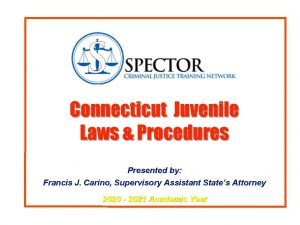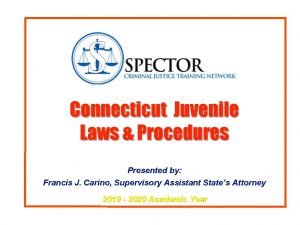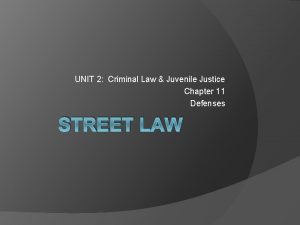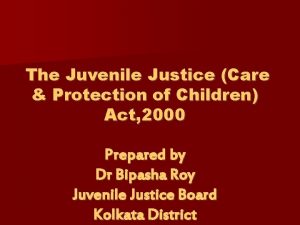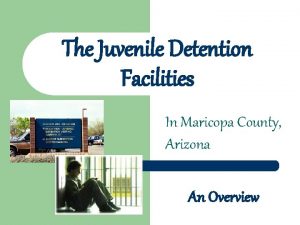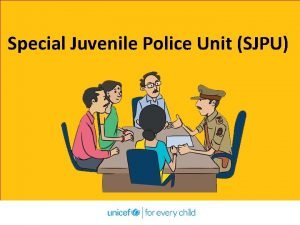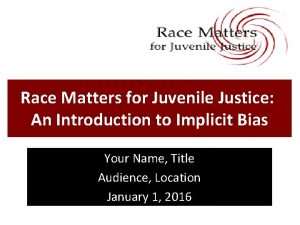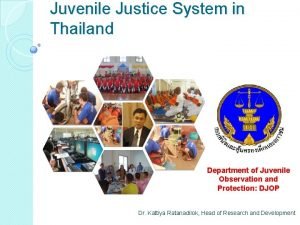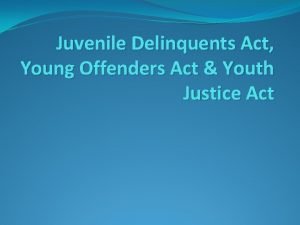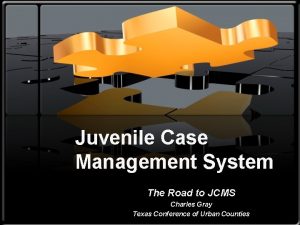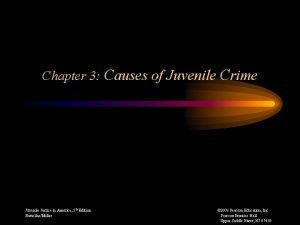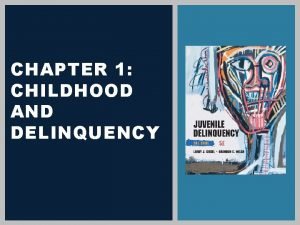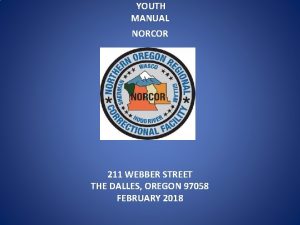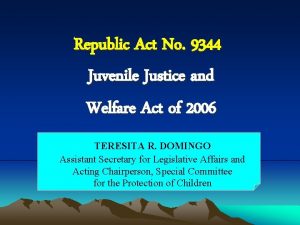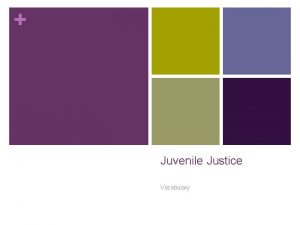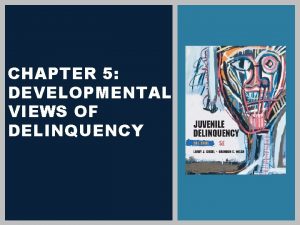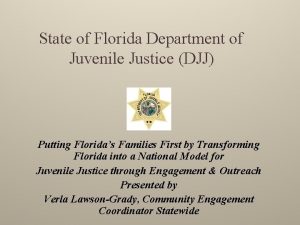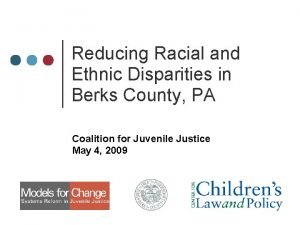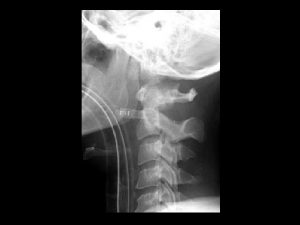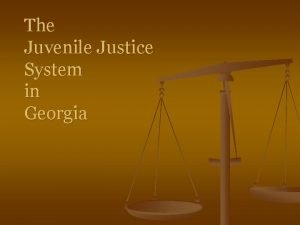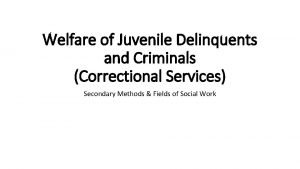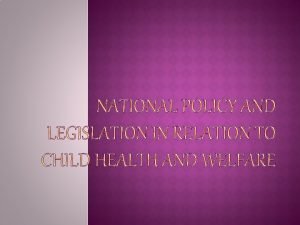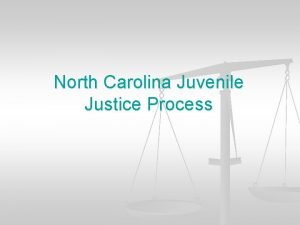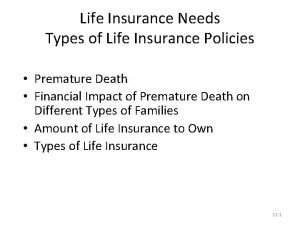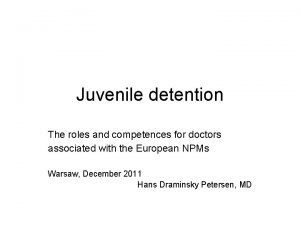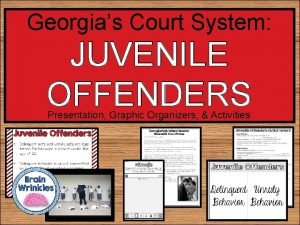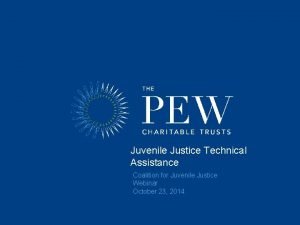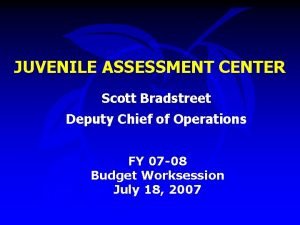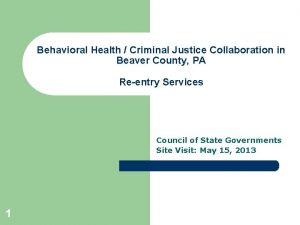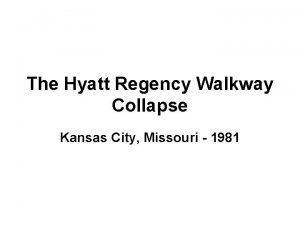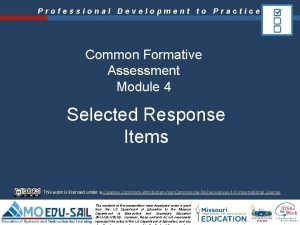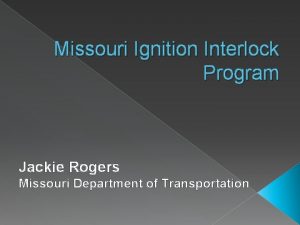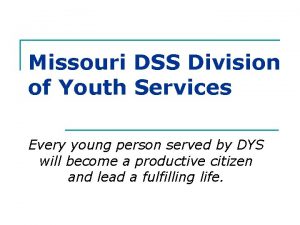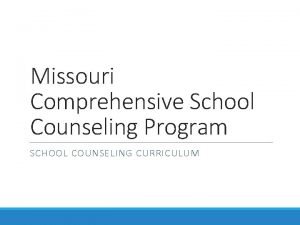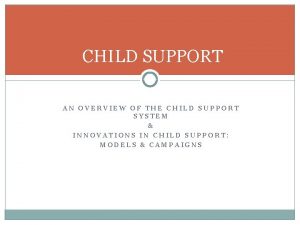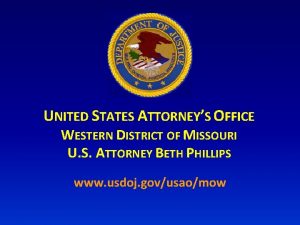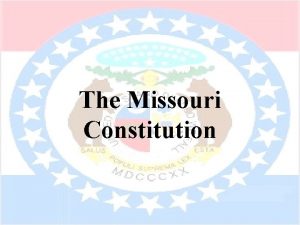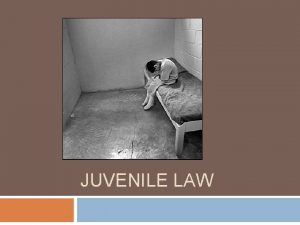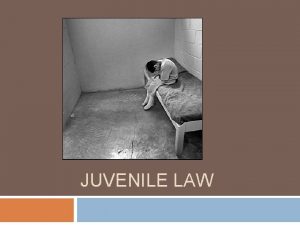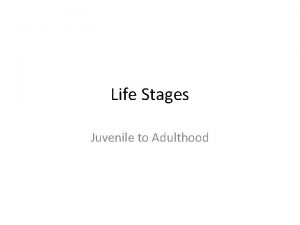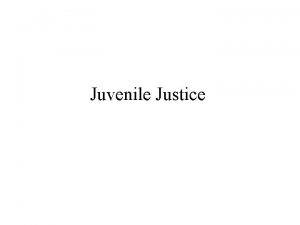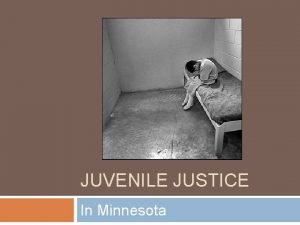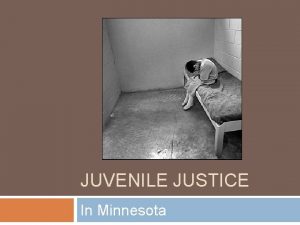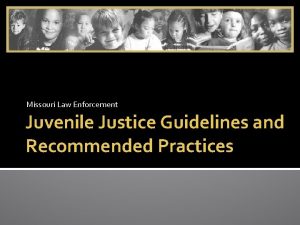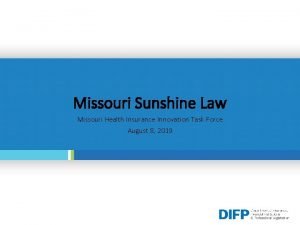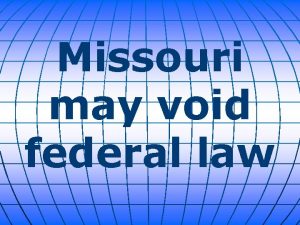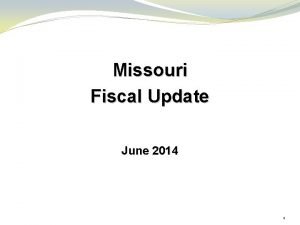JUVENILE LAW UPDATE MARCIA HAZELHORST EXECUTIVE DIRECTOR MISSOURI











































































- Slides: 75

JUVENILE LAW UPDATE MARCIA HAZELHORST, EXECUTIVE DIRECTOR MISSOURI JUVENILE JUSTICE ASSOCIATION

LEGISLATIVE UPDATE-2018 TRULY AGREED TO AND FINALLY PASSED BILLS 2018 Session named, “year of the child” as several child welfare initiatives were passed

SB 793 -RAISE THE AGE-DEFINITION CHANGES • Chapter 211. 021 -Definition changes • Adult-a person eighteen years of age or older • Child-any person under eighteen years of age

SB 793 -RAISE THE AGE-DELINQUENT ACTS • 211. 031. 1(3) changes Involving any child who is alleged to have violated a state law or municipal ordinance, or any person who is alleged to have violated a state law or municipal ordinance prior to attaining the age of eighteen years…. . Missouri Juvenile Code: Section 211. 031. 1(3) RSMo.

SB 793 RAISE THE AGE-STATUS OFFENSES • 211. 031. 1(2)-Involving any child who may be a resident of or found within the county and who is alleged to be in need of care and treatment because: • The child while subject to compulsory school attendance is repeatedly and without justification absent from school(will not have jurisdiction over 17 year old truant youth) • The child disobeys the reasonable and lawful directions of his or her parents or other custodian and is beyond their control • The child is habitually absent from his or her home without sufficient cause, permission, or justification • The behavior or associations of the child are otherwise injurious to his or her welfare or to the welfare of others

SB 793 -RAISE THE AGE-ORDER OF PROTECTION • 211. 031. 1(6)-Involving an order of protection pursuant to chapter 455 when the respondent is less than eighteen years of age

SB 793 -RAISE THE AGE-JAIL CONFINEMENT • 211. 033. 1 -No person under the age of eighteen years, except those transferred to the court of general jurisdiction under the provisions of section 211. 071 shall be detained in a jail or other adult detention facility as that term is defined in section 211. 151

SB 793 -RAISE THE AGE • 211. 041 -Every child over whose person the juvenile court retains jurisdiction shall be prosecuted under the general law for any violation of a state law or of a municipal ordinance which he or she commits after he or she becomes eighteen years of age. The juvenile court shall have no jurisdiction with respect to any such violation and, so long as it retains jurisdiction of the child, shall not exercise its jurisdiction in such a manner as to conflict with any other court’s jurisdiction as any such violation

SB 793 -RAISE THE AGE-CERTIFICATION • 211. 071. 1 -If a petition alleges that a child between the ages of twelve and eighteen has committed an offense which would be considered a felony if committed by an adult, the court may, upon its own motion or upon motion by the juvenile officer, the child or the child’s custodian, order a hearing…. • Still have mandatory certification hearings for youth ( up to age 18) who have committed one of the designated felonies-1 st and 2 nd Degree Murder, 1 st Degree Assault, Forcible Rape(as it existed prior to August 28, 2013), Rape in the 1 st Degree, Forcible Sodomy(as it existed prior to August 28, 2013) , Sodomy in the 1 st Degree, 1 st Degree Robbery(as it existed prior to January 1, 2017 and Distribution of Drugs(as it existed prior to January 1, 2017

SB 793 -RAISE THE AGE-ELIGIBILITY FOR DUAL JURISDICTION • 211. 073. 1 The court shall, in a case when the offender is under eighteen years of age and has been transferred to the court of general jurisdiction pursuant to 211. 071, and whose prosecution results in a conviction or a plea of guilty, consider dual of both the criminal and juvenile codes, as set forth in this section.

SB 793 -RAISE THE AGE-FUNDING • 211. 435. 1(new)-There is hereby created in the state treasury the “juvenile Justice Preservation Fund”, which shall consist of moneys collected under subsection 2 of this section and sections 488. 315 and 558. 003, any gifts, bequests, and donations, and any other moneys appropriated by the general assembly. …. The fund shall be a dedicated fund and, upon appropriation, moneys in the fund shall be distributed to the judicial circuits of the state based upon the increased workload created by sections 211. 021 to 211. 425 solely for the administration of the juvenile justice system…. . provisions of this section expire on August 28, 2024.

SB 793 -RAISE THE AGE-FUNDING • 211. 435. 2 -$2. 00 surcharge collected for all traffic violations of any county ordinance or any violation of traffic laws of this state, including an infraction when person has pled guilty • 488. 315. 1 - $3. 50 surcharge assessed in all civil actions filed in the state • 588. 003 -The prosecuting attorney shall have discretion to charge an offender convicted of an offense in which the victim was a child a fine of up to $500 for each offense

SB 793 -RAISE THE AGE-FUNDING • Section 1 -Look back provision: Expanding services from seventeen years of age to eighteen years of age is a new service and shall not be effective until an appropriation sufficient to fund the expanded service is provided therefor.

SB 793 -RAISE THE AGE-EFFECTIVE DATE Raising the age of juvenile court jurisdiction does not become effective until January 1, 2021. Juvenile Justice Preservation Fund begins accumulating funds on August 28, 2018.

RAISE THE AGE-CHALLENGES • Defining 17 year-olds • Youth who turn 17 prior to January 1, 2021 would be handled as adults, however if they commit an offense after January 1, 2021, they would be considered a juvenile until they turn age 18

RAISE THE AGE-CHALLENGES • Implementation date could change if funding is insufficient prior to effective date • Juvenile Justice Preservation Fund is projected to produce approximately 9 million in funding and fiscal note projections anticipate costs to be upwards of 14 million dollars

RAISE THE AGE-FOLLOW UP LEGISLATION • 219. 021 -Age of commitment to DYS • The division shall not keep any youth beyond his eighteenth birth date, except upon petition and a showing of just cause in which the division may maintain custody until the youth’s twenty-first birth date • Need to increase the age of commitment to nineteen

RAISE THE AGE-FOLLOW-UP LEGISLATION • 167. 031 -compulsory school attendance age • Youth are currently subject to compulsory school attendance until age 17 or successful completion of 16 credit hours • Consider raising this to age 18 to be in line with juvenile court jurisdiction

SB 793 -PROSTITUTION • 567. 020. 5 -…”it shall be an affirmative defense to prosecution pursuant to this section that the defendant was under the age of eighteen and was acting under the coercion, as defined in section 566. 200, of an agent at the time of the offense charged” • 567. 030. 3 -the offense of patronizing prostitution changed from an A misdemeanor to a class E felony when the individual who the person patronizes is less than 18 but older than 14 years of age • 567. 030. 4 -class D felony now instead of class E felony if the individual who the person patronizes is 14 years of age or younger

SB 793 -PROSTITUTION • 567. 060. 1 (2)-Promoting prostitution in the 2 nd degree • “Promotes prostitution of a person sixteen or seventeen years of age”

SB 793 -SEX OFFENDER REGISTRY • 589. 400 adds patronizing prostitution if the individual the person patronizes is less than eighteen year of age

SB 793 -EXPUNGEMENT OF RECORDSPROSTITUTION • 610. 131…”an individual who at the time of the offense was under the age of eighteen, and has pleaded guilty or has been convicted for the offense of prostitution under section 567. 020 may apply to the court in which he or she pled guilty or was sentenced for an order to expunge from all official records…” • Court shall enter an order of expungement if after a hearing the court determines the person was acting under the coercion of an agent when committing the offense

SB 655 -MINIMUM AGE FOR MARRIAGE • 451. 090. 1 “No recorder shall issue a license authorizing the marriage of any male or female under sixteen years of age nor shall a license be issued authorizing the marriage of any male or female 21 years of age or older to a male or female under 18 years of age • 451. 090. 3 …. ” Applicants shall provide proof of age to the recorder in the form of a certified copy of the applicant’s birth certificate, passport, or other governmentissued identification…”

SB 655 -JUVENILE SEX OFFENDER REGISTRATION • 589. 402. 5 “Juveniles required to register under subdivision (5) of subsection 1 of section 589. 400 shall be exempt from public notification to include any adjudications from another state, territory…. ” • Juveniles required to register as an adult must register within three business days of adjudication or release from commitment to DYS, DMH or other placement • Juvenile 14 or older at time of offense and adjudicated for a felony offense equal to or more severe than aggravated sexual abuse must register as an adult

SB 819 -CHILD WELFARE REFORM BILL • Establishes a social Innovation Grant Program within the Office of Administration to address “a critical state of concern” • No fees will be required or collected for a birth, death or marriage certificate if requested by Children’s Division, DYS, Juvenile Officer or Guardian Ad Litem for a child under the jurisdiction of the Juvenile Court • Establishes the Supporting and Strengthening Families Act • Allows CD to accept a report for a child abuse or neglect investigation or family assessment if the child or alleged perpetrator resides in Mo, may be found in Mo or if the incident occurred in Mo. • Allows CD to co-investigate a report of child abuse or neglect as well as share information and records with entities in other states if deemed appropriate to do so

SB 819 -CHILD WELFARE REFORM • Investigation reports where the Children’s Division finds insufficient evidence of abuse or neglect shall be retained for ten years. Reports where child is unable to be located shall be maintained for 18 years from date of report • Records relating to foster home or kinship placements of children in foster care shall be considered close records under state law. Does allow for records to be disclosed to juvenile officers, law enforcement and prosecutors when there has been a child fatality or near fatality • Creates the Trauma Informed Care for Children and Families Task Force • Youth in CD custody who are 16 years of age or older may open a checking or savings account • A minor shall be able to contract for admission to a rape crisis center under certain circumstances

SB 819 -CHILD WELFARE REFORM • Permits adoptive parents and the birth parents of a child to enter into a written post adoption contact agreement to allow contact, communication, and the exchange of photographs after termination of parental rights and adoption occurs • Court shall enforce the agreement unless doing so would be in the best interest of the child

SB 800 -RAISE THE AGE LANGUAGE • Includes Raise the Age language found in SB 793

LEGISLATION • Questions?

MISSOURI JUVENILE OFFICER PERFORMANCE STANDARDS 2017 This Photo by Unknown Author is licensed under CC BY-NC-SA

MISSOURI JUVENILE OFFICER PERFORMANCE STANDARDS In 2001, several juvenile justice practitioners gathered to create Missouri’s first Standards for the Administration of Juvenile Justice. The standards were aspirational and addressed eight general performance areas. There was no training on the Standards and, for the most part, they went unnoticed. There was no concerted attempt to monitor compliance or create performance standards to gauge effectiveness.

MISSOURI JUVENILE OFFICER PERFORMANCE STANDARDS The original Standards were revised in 2004, however, they remained aspirational and only slightly broadened the scope to include some specific elements within the eight general practice areas. The entire document was only 12 pages in length and, again, there was no concerted effort to train juvenile officers or monitor compliance.

MISSOURI JUVENILE OFFICER PERFORMANCE STANDARDS In 2014, Missouri’s Chief Juvenile Officers met to discuss concerns regarding inconsistency in practice throughout the state and proposed juvenile justice reforms. The result of that meeting was a request to Office of State Court’s Administrator (OSCA) to allow for an extensive review and revision of the 2004 Revised Missouri Court Performance Standards for the Administration of Juvenile Justice.

MISSOURI JUVENILE OFFICER PERFORMANCE STANDARDS The request was approved and the Missouri Juvenile Standards Workgroup was created in April, 2014 to serve as the steering committee for the work. There was a firm belief that the burden for correcting and improving practices in the juvenile office rested with the JUVENILE OFFICER. However, this group also recognized that input from professional partners and stakeholders was going to be critical, moving forward.

MISSOURI JUVENILE OFFICER PERFORMANCE STANDARDS Although the Steering Committee was – by design – comprised primarily of Chief Juvenile Officer’s from across the state, four Sub Committees were created and were comprised – also by design – with representatives from the Public Defender, private attorneys, attorneys from Division of Legal Services, CD staff, staff from child protection centers, Office of Child Advocate, Missouri Kids. First, foster and adoptive coalitions, Missouri CASA, Department of Mental Health and Division of Youth Services.

MISSOURI JUVENILE OFFICER PERFORMANCE STANDARDS The Steering Committee and the Sub Committees began meeting in June, 2014. From 2014 – 2016, there were approximately 140 meetings of the JSWG and Sub Committees, with an investment of almost 4, 200 hours of work by members. In July, 2016, the JSWG submitted a draft of the revised Standards. The draft was approved by the Family Court Committee and submitted to the Supreme Court for review and input.

MISSOURI JUVENILE OFFICER PERFORMANCE STANDARDS In December, 2016, the Supreme Court entered an order modifying Rule 110 to incorporate the 2017 Missouri Juvenile Officer Performance Standards as an Appendix to the rule. Also in December, 2016, the Office of State Courts officially adopted the Standards to become effective July 1, 2017. The 2017 Standards are approximately 175 pages long, contain a Code of Ethics, and 90 Performance Standards, almost all of which are MANDATORY and contain detailed comments about suggested best practice and implementation.

MISSOURI JUVENILE OFFICER PERFORMANCE STANDARDS The 2017 Missouri Juvenile Officer Performance Standards are divided into five sections, as follows: • Administrative Standards for the Juvenile Officer • Standards for Pre-Disposition in Delinquency and Status Offense Matters • Standards for Post-Disposition in Delinquency and Status Offense Matters • Standards for the Juvenile Officer in Matters of Child Abuse and Neglect • General Practice Standards for the Juvenile Officer

MISSOURI JUVENILE OFFICER PERFORMANCE STANDARDS Implementation of the Standards is currently being monitored by the Juvenile Officer Performance Oversight Committee. This Committee was responsible for creating recommendations for the following two Standards: • Standard 1. 5 – Compliance Review A Subcommittee exists to create a recommendation. Target date for implementation is December 31, 2018 • Standard 1. 6 – Formal Complaint Process A Subcommittee also exists to create a recommendation. Target date for implementation is December 31, 2018.

JUVENILE OFFICER PERFORMANCE STANDARD 1. 5 -COMPLIANCE REVIEW OF THE JUVENILE OFFICER • Standard 1. 5 -”The juvenile officer shall comply with the Missouri Juvenile Officer Performance Standards(2017) and shall be subject to compliance reviews pursuant to section 211. 326, RSMo 2000”. • Standard 1. 5 -Compliance Review Recommendations: • Self-Assessment • Peer review assessment • Formal review assessment

JUVENILE OFFICER PERFORMANCE STANDARD 1. 6 -FORMAL COMPLAINT PROCESS • Standard 1. 6 -”The state courts administrator shall establish a centralized complaint process. All meritorious complaints shall be referred to the appropriate presiding circuit judge for review and resolution including disciplinary measures up to and including removal of the juvenile officer from office”. • Standard 1. 6 -Complaint Process Recommendations: • Needs to be in writing(form on OSCA website) • Against the Juvenile Officer(if against a DJO, has the JO been informed of the issue and failed to address it) • Meritorious complaint investigated by a review committee

JUVENILE OFFICER PERFORMANCE STANDARD 2. 2 -INITIAL REFERRAL REVIEW • Standard 2. 2 (A)-”The juvenile officer shall date stamp any referral received upon receipt in the juvenile office • Standard 2. 2 (B)-”The juvenile officer shall require all referrals to be in writing and signed by the person making the referral…whenever practicable. ” • Standard 2. 2(C)-The juvenile officer shall make an initial and prompt determination regarding the sufficiency of the referral and determine whether: • Jurisdictional elements are established • Contains a clear statement of the act alleged • Sufficient evidence to support action by the juvenile officer • Information supports the need for action by the juvenile officer

JUVENILE OFFICER PERFORMANCE STANDARD 2. 2 -INITIAL REFERRAL REVIEW • Standard 2. 2(D)-“The juvenile officer shall make a written request of the referring party for additional investigation or information necessary to determine sufficiency of the allegation in the referral and include a reasonable period for response by the referring party/person. ” • Standard 2. 2(E)-“The juvenile officer shall require referrals relating to allegations of a delinquent act to include an investigation by law enforcement. ” • Standard 2. 2(F)-”The juvenile officer shall close the case as soon as practicable upon a determination that the referral is not legally sufficient or no action is required by the juvenile officer. ”

JUVENILE OFFICER PERFORMANCE STANDARD 2. 2 -INITIAL REFERRAL REVIEW • Standard 2. 2 (G)-“The juvenile officer shall provide, in writing, to the referring party or person the reason the referral is not sufficient to establish or warrant action by the juvenile officer. ” • Standards 2. 2(H)-”The juvenile officer or attorney for the juvenile officer shall consult with the referring party, upon request, regarding any referral rejected by the juvenile officer and review additional information or information provided during that consultation. ”

JUVENILE OFFICER PERFORMANCE STANDARD 2. 1 -ADVISEMENT OF RIGHTS AND PARENTAL PRESENCE Standard 2. 1(A)- “The juvenile officer or a designee approved and trained by the Juvenile Officer to act on behalf of the juvenile officer shall advise a juvenile of his or her rights during a custodial interrogation by law enforcement. ” Standard 2. 1(B)-. . ”The juvenile officer shall ensure any designee complies with the specific requirements for the juvenile officer” Standard 2. 1(C)-. . ”The juvenile officer or designee shall ensure a juvenile is advised of their limited role during the interrogation by law enforcement and specifically advise the juvenile that they are not legal counsel for the juvenile or an advocate for the juvenile during the questioning by law enforcement. ”

JUVENILE OFFICER PERFORMANCE STANDARD 2. 1 -ADVISEMENT OF RIGHTS AND PARENTAL PRESENCE Standard 2. 1(D)- “The juvenile officer or designee shall not participate in the questioning by law enforcement by asking any questions or soliciting any information from the juvenile regarding the alleged offense(s). ” Standard 2. 1(E)-”The juvenile officer or designee shall prohibit or end questioning by law enforcement wherein the juvenile appears to lack the capacity to understand the advisement of rights and waiver, requests to stop answering questions, or requests legal counsel. ” Standard 2. 1(F)-”The juvenile officer or designee shall ensure a parent, guardian, custodian or friendly adult of the juvenile’s choosing is present during the questioning and has sufficient time to consult and advise the juvenile before and during the questioning. ”

JUVENILE OFFICER PERFORMANCE STANDARD 2. 1 -ADVISEMENT OF RIGHTS AND PARENTAL PRESENCE Standard 2. 1(G)- “Juvenile Officer or designee shall administer the advisement of rights orally and in writing and ensure appropriate language or required assistive resources are available before the initiation of the questioning”.

JUVENILE OFFICER PERFORMANCE STANDARD 2. 1 -ADVISEMENT OF RIGHTS AND PARENTAL PRESENCE Standard 2. 1(H)-”The Rights advisement to a juvenile shall include: 1. Right to remain silent; 2. Any statement the juvenile does make can be and may be used against the juvenile in subsequent juvenile court proceedings; 3. Any statement made to law enforcement can and may be used against the juvenile if the juvenile is transferred to a court of general jurisdiction to be prosecuted under the general law; 4. Right to have a parent, guardian, or custodian present during questioning; the 5. Right to consult with an attorney and that one will be appointed and paid for if juvenile cannot afford one; and 6. Right to stop talking at any time. ”

JUVENILE OFFICER PERFORMANCE STANDARD 2. 1 -ADVISEMENT OF RIGHTS AND PARENTAL PRESENCE • Standard 2. 1(I)-”The juvenile officer or designee shall address with the juvenile potential conflicts in circumstances wherein the alleged victim or co-defendant is the parent to aid in ensuring a “friendly adult” is available to consult with the juvenile • Standard 2. 1(J)-”The juvenile officer or designee shall ensure the location and timeframe of the questioning by law enforcement are appropriate. ” • Standard 2. 1(K)-”The juvenile officer shall establish a written protocol to facilitate the prompt consideration by the court as to the appointment of legal counsel for a juvenile upon request before or during questioning by law enforcement. ”

JUVENILE OFFICER PERFORMANCE STANDARD 4. 2 -ROLE OF JUVENILE OFFICER IN CHILD WELFARE INVESTIGATIONS • Standard 4. 2 -”The juvenile officer shall not serve as the primary investigator of child abuse and neglect. ”

• JUVENILE OFFICER PERFORMANCE STANDARD 4. 5 - REQUESTS FOR PROTECTIVE CUSTODY Standard 4. 5(A)-”The juvenile officer shall review and respond to the referring agency or person within three hours of receipt of a referral for protective custody. ” • Standard 4. 5(B)-”The juvenile officer shall provide an immediate written response to the agency or person requesting protective custody if the juvenile officer does not believe the request for protective custody is sufficient and the juvenile officer will not proceed with an authorization for protective custody. ” • Standard 4. 5(E)-”The juvenile officer shall not authorize protective custody of any child absent a written request from the requesting agency or person unless the juvenile officer believes the child is at risk of immediate harm or threat to life based on his or her direct observation and knowledge as to the alleged child abuse or neglect. ”

JUVENILE OFFICER PERFORMANCE STANDARD 5. 17 -SCHOOL INTERVENTIONS AND SAFE SCHOOLS ACT • Standard 5. 17(C)-”The juvenile officer shall refrain from activities that expand the role of the juvenile officer to matters of school discipline or diminish the educational prospects of the juvenile and increase the risk of additional referrals by identification or association as to the involvement with the juvenile officer or juvenile court”.

JUVENILE OFFICER PERFORMANCE STANDARDS • Questions?

LAW ENFORCEMENT AND CHILD ABUSE AND NEGLECT

EMERGENCY PROTECTIVE CUSTODY • Who can take a child • When can the child be taken • Why can the child be taken • What is required • How long

PROTECTIVE CUSTODY • Law Enforcement and Physicians • Can authorize protective custody for no more than 24 hours, if reasonable cause to believe the child is in imminent danger of suffering serious physical harm or a threat to life as a result of abuse or neglect and reasonable cause to believe that such physical harm or threat to life may occur before a court could issue a temporary protective custody order SCR 123. 01 and 210. 125, RSMo

PROTECTIVE CUSTODY • SCR 123. 02 and Section 210. 125, RSMo requires the law enforcement officer or physician to: • immediately notify the juvenile officer and the Children’s Division • make reasonable attempts to notify the parents • submit a written report to the Juvenile Officer as soon as practicable but NO LATER THAN 12 hours after the child was taken into custody

PROTECTIVE CUSTODY • Written report must identify the juvenile, state the facts and circumstances that caused the law enforcement officer or physician to believe the juvenile was in IMMINENT DANGER of suffering serious physical harm or a threat to life as a result of abuse or neglect • Must be submitted even if juvenile is released

PROTECTIVE CUSTODY • Juvenile Officer • Can authorize protective custody for a maximum of 24 hours if reasonable cause to believe that the child is without proper care, custody or support; or that temporary protective custody is necessary to prevent personal harm to the child.

ELEMENTS OF IMMINENT DANGER • Time – the danger is imminent or immediate • The perceived risk is serious: • Threat to life or serious physical harm • Sexual abuse • Action must be taken immediately to prevent further harm

FOURTH AMENDMENT The right of the people to be secure in their persons, houses, papers, and effects, against unreasonable searches and seizures, shall not be violated, and no warrants shall issue, but upon probable cause, supported by oath or affirmation, and particularly describing the place to be searched, and the persons or things to be seized.

PROTECTED INTEREST • The United States Supreme Court has held that a parent, guardian or custodian has a constitutionally protected liberty interest in his/her relationship with their child. • Children have a constitutionally protected liberty interest in their relationship with their parents. • The State cannot deprive a person of a liberty interest without due process of law.

THE STATE • The State has a constitutionally recognized compelling interest in protecting children from abuse or neglect. • The State’s rights to protect must be balanced against the rights of parents.

PROVING IMMINENT DANGER-THE STANDARD • The state's interest in protecting children does not supersede the parents, guardian or custodian's liberty interest in their relationship with the child unless, the state has “some definite and articulable evidence giving rise to a reasonable suspicion that a child has been abused or is in imminent danger of abuse. ” Heartland vs. Waddle, 317, Supp. 984, 1099 (W. D. Mo. 2004) • The state must therefore have an objectively reasonable, factual basis for believing that parental custody constitutes a threat to the child’s health or safety before governmental officials may remove the child. Id. A “GUT” FEELING OR CONCERN IS NOT ENOUGH TO ESTABLISH A CASE

DUE PROCESS • Must be fairness in the process • Prior to removal, parents have a right to: • Notice • Opportunity to be heard: • Hearing • Test and rebut evidence

DUE PROCESS - EXCEPTIONS • Due process not required in exigent circumstances. • Reasonable cause to believe that each child for whom protective custody is sought is in: • Imminent danger of suffering serious physical harm, or • Imminent danger of threat to life from abuse/neglect, or • Has been sexually abused, or • Imminent danger of sexual abuse

CHILDREN’S DIVISION CS-33 -PURPOSE OF FORM • Provide written authorization when the Children’s Division has been asked to provide alternative care for a child when a juvenile officer, law enforcement official or a physician takes protective custody • CS-33 may be used by juvenile officer, law enforcement official or physician. • CD should request the juvenile officer, law enforcement official or physician to complete the form prior to CD transporting the child to an alternative placement • Copies go to: CD record, LE official or physician who authorized PC, juvenile officer, foster parent or alternative placement provider and the biological parent/caregiver Children’s Division Instructions-CS 33

USE OF CS-33 AND LAW ENFORCEMENT • When should the form be completed? • Who should complete the form? • What is your responsibility following authorization of emergency protective custody?

LAW ENFORCEMENT AND CHILD WELFARE • Questions?

JUVENILE LAW-MISCELLANEOUS UPDATES • Supreme Court of Missouri Commission on Racial and Ethnic Fairness Report. November 2017 -Additional items under consideration: • Explore collaborations with school districts, restorative justice programs, and juvenile and family courts to deal with juveniles who present school disciplinary problems • Initial and ongoing training in implicit bias and cultural competency for juvenile and family court staff; offer this training to law enforcement, school resource officers, and school personnel in the areas of school suspension, truancy prevention and collaboration • Require evidentiary probable cause determinations in certification hearings

COMMISSION ON RACIAL AND ETHNIC FAIRNESS-CONSIDERATIONS • Incorporate proposed Miranda Warnings which can be easily understood by juveniles • Educate juveniles and their families regarding Informal Adjustment process, services and interventions that may be offered • Adopt rule which prohibits the admissibility of spontaneous statements and any statements made by the juvenile prior to Miranda warning being given • Identify and implement strategies for improved information sharing between the courts and the juvenile justice and child welfare agencies

COMMISSION ON RACIAL AND ETHNIC FAIRNESS-CONSIDERATIONS • Recommend the creation of a juvenile privilege against self-incrimination, including an attorney present before police interrogations • Advise juveniles and parents that an admission is not required in an informal adjustment • Survey all deputy juvenile officers regarding juvenile representation

MJJA LAW ENFORCEMENT GUIDELINES AND BEST PRACTICES • Currently being updated, should be out in the Fall • Revised Law Enforcement Video on best practices released last year • Parting the Pipeline: Law Enforcement's Guide to Best Practices with Youth in Custody

MJJA LAW ENFORCEMENT GUIDELINES AND BEST PRACTICES • Questions?

CONTACT INFO: Marcia Hazelhorst Executive Director, Missouri Juvenile Justice Association 573 -616 -1058 marcia@mjja. org
 Missouri juvenile officer performance standards
Missouri juvenile officer performance standards Missouri executive branch
Missouri executive branch Is an alternative of log based recovery
Is an alternative of log based recovery Connecticut division of criminal justice
Connecticut division of criminal justice Soc 106
Soc 106 Fran carino juvenile law website
Fran carino juvenile law website Fran carino juvenile law
Fran carino juvenile law Criminal law and juvenile justice unit 2
Criminal law and juvenile justice unit 2 Missouri tenant rights
Missouri tenant rights Newton's first law and second law and third law
Newton's first law and second law and third law Newton's first law of motion
Newton's first law of motion V=k/p
V=k/p P=k/v
P=k/v Cncp and ccl
Cncp and ccl Maricopa county juvenile detention
Maricopa county juvenile detention S j p u
S j p u Race matters for juvenile justice
Race matters for juvenile justice Pauciarticular juvenile rheumatoid arthritis
Pauciarticular juvenile rheumatoid arthritis Department of juvenile observation and protection
Department of juvenile observation and protection Juvenile delinquents act 1908
Juvenile delinquents act 1908 Juvenile delinquents turn heroes
Juvenile delinquents turn heroes Juvenile delinquents act
Juvenile delinquents act Juvenile case management system
Juvenile case management system Individual delinquency
Individual delinquency Hintspp
Hintspp What is the nature and extent of juvenile delinquency
What is the nature and extent of juvenile delinquency Objectives of studying juvenile delinquency
Objectives of studying juvenile delinquency Norcor the dalles oregon
Norcor the dalles oregon Poverty and delinquency
Poverty and delinquency R a 9344
R a 9344 Miami-dade county juvenile services department
Miami-dade county juvenile services department Juvenile justice vocabulary
Juvenile justice vocabulary Vicki douglas juvenile center
Vicki douglas juvenile center Developmental views of delinquency
Developmental views of delinquency Juvenile biography
Juvenile biography State of florida department of juvenile justice
State of florida department of juvenile justice Berks county juvenile probation
Berks county juvenile probation Juvenile justice alternative education program
Juvenile justice alternative education program Radial head fractire
Radial head fractire Juvenile justice system georgia
Juvenile justice system georgia Angiofibroma nasofaring
Angiofibroma nasofaring Seminole county juvenile detention center
Seminole county juvenile detention center Classification of juvenile delinquency
Classification of juvenile delinquency Treatment of juvenile delinquency
Treatment of juvenile delinquency Juvenile justice act 2000
Juvenile justice act 2000 North carolina juvenile justice process
North carolina juvenile justice process Insurance
Insurance Management of juvenile delinquency
Management of juvenile delinquency Juvenile delinquency graphic organizer
Juvenile delinquency graphic organizer Juvenile justice system in georgia
Juvenile justice system in georgia Juvenile crime singapore
Juvenile crime singapore Gynécomastie dendritique
Gynécomastie dendritique Indeterminate sentencing juvenile
Indeterminate sentencing juvenile Coalition for juvenile justice
Coalition for juvenile justice Minnesota juvenile justice system
Minnesota juvenile justice system Orange county juvenile assessment center
Orange county juvenile assessment center Beaver county juvenile probation
Beaver county juvenile probation Missouri educators trust
Missouri educators trust Hyatt regency disaster
Hyatt regency disaster Drc insight missouri
Drc insight missouri Rap back program missouri
Rap back program missouri Missouri ignition interlock
Missouri ignition interlock Missouri division of youth services
Missouri division of youth services Missouri comprehensive guidance and counseling program
Missouri comprehensive guidance and counseling program Program components
Program components Child support arrears forgiveness letter missouri
Child support arrears forgiveness letter missouri Missouri pta
Missouri pta Gibbons v ogden what ideas did the measure contain
Gibbons v ogden what ideas did the measure contain Western district of missouri us attorney
Western district of missouri us attorney Career cluster definition
Career cluster definition Adt irrigation
Adt irrigation How many constitutions has missouri had
How many constitutions has missouri had Missouri cancer registry
Missouri cancer registry Missouri primary care association
Missouri primary care association Weatherization assistance program missouri
Weatherization assistance program missouri Missouri economic research and information center
Missouri economic research and information center
